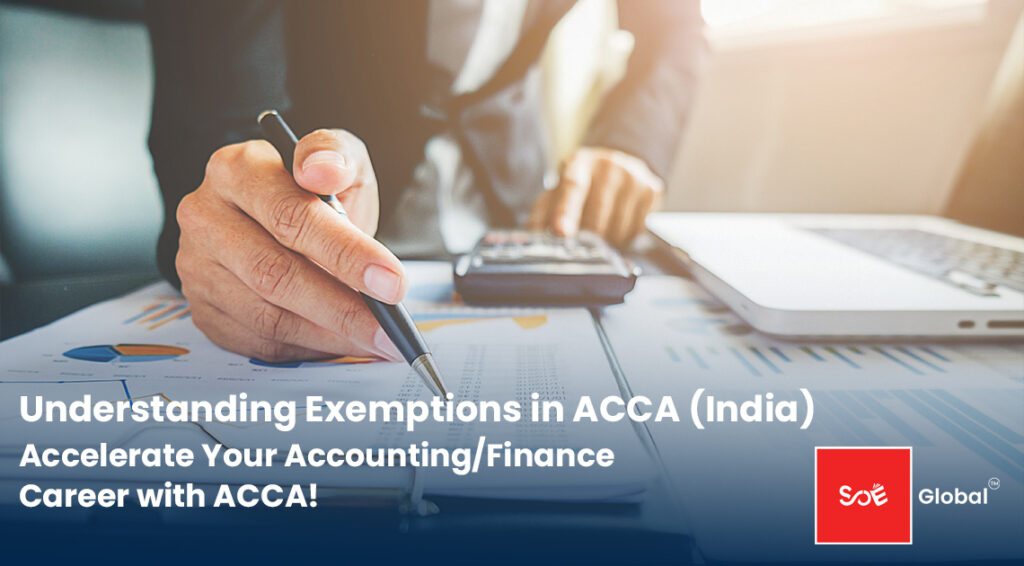Understanding Exemptions in ACCA
ACCA (Association of Chartered Certified Accountants) is a globally recognized professional accounting qualification, offering a comprehensive and globally relevant syllabus to aspiring finance professionals.
The qualification comprises 13 papers that cover topics related to financial accounting, management accounting, taxation, audit, and law. The program is designed to equip students with the skills and knowledge required to work in various roles within the finance industry.
Have A Query About ACCA, Book a Free Consultation Now!
ACCA does not offer exemptions to 10th and 12th standard students. However, ACCA recognizes that some of the ACCA aspirants may have already completed courses that cover similar parts of the syllabus to those included in the ACCA syllabus. As such, ACCA offers exemptions to such students, allowing them to skip certain papers based on their prior learning. This article will provide an overview of ACCA exemptions in India, including how to apply for exemptions, the criteria for exemptions, and the benefits of exemptions.
ACCA syllabus breakage:
Knowledge level:
- Business & Technologies
- Management Accounting
- Financial Accounting
Skill level:
- Corporate Business Law
- Performance Management
- Taxation
- Financial Reporting
- Audit & Assurance
- Financial Management
Professional Level:
Essential papers
- Strategic Business Leader
- Strategic Business Reporting
Optional papers
- Advanced Financial Management
- Advanced Performance Management
- Advanced Taxation
- Advance Audit & Assurance
How do I calculate my exemptions?
1. Exemption calculator
The ACCA Exemptions Calculator is a tool provided by the Association of Chartered Certified Accountants (ACCA) to help individuals determine if they are eligible for exemptions from certain ACCA exams based on their prior qualifications. The calculator takes into account your educational background and qualifications and assesses whether you have covered similar content in your previous studies that aligns with ACCA’s syllabus.
The primary purpose of the ACCA Exemptions Calculator is to provide a preliminary indication of the exemptions you may be eligible for. It helps you understand which ACCA papers you may not need to sit for, saving you time and effort in your ACCA journey.
By using the calculator, you can input information about your completed degrees, diplomas, or professional certifications, along with the country or educational institution where you obtained them. The calculator then matches your qualifications against the ACCA syllabus and determines which papers you may be exempt from.
It’s important to note that the ACCA Exemptions Calculator provides an initial indication, and the final decision on exemptions is made by ACCA after a formal exemption application process. To obtain formal exemptions, you need to submit supporting documents such as certifications and course syllabi for evaluation by ACCA.
2. Exemptions for an Undergraduate:
The main benefit of exemptions is that they reduce the time and cost required to complete the ACCA qualification. By skipping certain papers, students can complete the qualification faster and at a lower cost. This can be particularly beneficial for students who have already completed undergraduate courses that cover similar topics to those included in the ACCA syllabus. Based on their undergrad degree, one can get the following exemptions:
| Graduation | Exemptions applicable |
| B. Com | First 4 papers are exempted |
| BBA | 1 papers are exempted |
| BAF | 4 papers are exempted |
| BMS (Finance) | 1 paper is exempted |
| BMS (Marketing) | No Exemptions |
| BFM & BBI(graduates are required to send their certifications to ACCA and get approved to qualify for exemptions) | If qualified, 4 papers are exempted |
3. Exemptions based on their CA qualification
Exemptions can also provide CA students with a competitive advantage in the job market. Employers may value students who have received exemptions as they have already demonstrated their knowledge and expertise in certain areas of finance.
Students who are studying CA and graduates who cleared CA can also apply for the exemptions. But the number of exemptions would vary according to their level of completion.
| CA Level | Group cleared | Exemptions applicable |
| Foundation level | No exemptions | |
| IPCC | Group 1 & Group 2 | 5 exemptions |
| IPCC (B.Com graduate) | Group 1 clearedOr Passed the TAX paper | 5 exemptions (Tax + 4 papers from B.com) |
| Group 2 clearedOr Passed the AUDIT paper | 5 exemptions (Audit + 4 papers from B.com) | |
| Group 1 & Group 2 | 6 exemptions (Tax + Audit + 4 papers from B.com) | |
| Final CA | Group 1 clearedOr Passed the FR & FM paper | 8 exemptions( FR + FM + 6 exemptions from IPCC) |
| Group 2 clearedOr Passed the COSTING paper | 7 exemptions(COSTING + 6 exemptions from IPCC) | |
| Group 1 & Group 2 | 9 exemptions(FR + FM + COSTING + 6 exemptions from IPCC) |
Remember, these exemptions are given particularly to the papers that overlap both syllabi.
4. Exemptions for a Postgraduate:
| Qualifications | Exemptions Applicable |
|---|---|
| MBA | No exemptions |
| MBA (Finance) | 3 exemptions |
Note that the course exemptions for students who have both a B.Com and an MBA in Finance overlap. Therefore, it will reflect exemptions for one of the degrees and not the sum of both.
5. Exemptions for other accounting qualifications
| Qualifications | Exemptions Applicable |
| CFA | No exemptions |
| CPA | 8 exemptions |
| (US) CMA | 3 exemptions |
| (Indian) CMA | 5-7 exemptions |
| CMA + 5 Years of Experience | Upto 9 exemptions |
Obtaining exemptions in the ACCA qualification can be a significant advantage for students in India who have prior qualifications or relevant educational backgrounds. It not only saves time and money but also allows individuals to focus on specific areas of interest or career goals within the finance industry. While exemptions can vary from university to university and depend on the relevance of prior qualifications, it is crucial for aspiring ACCA students to explore the possibilities and benefits of exemptions.
In addition to this knowledge, we encourage candidates to return to the ACCA Exemptions Calculator. Additionally, we invite you to reach out to our institute for personalized guidance and support in navigating the exemption process.At SOE Global, we are experienced in assisting students in crafting a tailored plan that maximizes their exemptions while ensuring a well-rounded and comprehensive learning experience.
Exemption Fee:
In order to benefit from exemptions in India, candidates are required to pay a nominal exemption fee. For each paper in the knowledge level, the fee amounts to 84 pounds, while for each paper in the skill level, it is 111 pounds. However, by registering through SOE Global, students can take advantage of a significantly reduced fee of only 15 pounds per paper in both knowledge and skill levels. With such advantageous opportunities provided by SOE Global and ACCA exemptions, why wait any longer? Take the next step and reach out to us today to unlock a world of possibilities.
Remember, exemptions are not only a way to fast-track your ACCA qualification but also an opportunity to delve deeper into specialized areas of finance. By utilizing exemptions, students can concentrate on advancing their knowledge and skills in particular subjects, thereby improving their career prospects in the competitive finance industry.
Discover your eligibility, explore the possibilities, and let our institute guide you towards a successful and rewarding journey in accounting and finance. Together, let’s unlock the doors to your professional growth and unleash your potential in the dynamic world of finance with ACCA.




